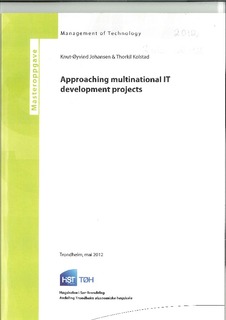| dc.description.abstract | In an overall setting this can be viewed as the beginning of a major change operation which can lead to a more transparent transport and logistics industry. Through the EU-project called
Finest, one seeks to improve the communication and interaction in this industry by developing a new collaboration platform based on possibilities in future Internet technology. This study has focused primarily on the experience and actions from the four Norwegian partners that constitutes one of three use cases in this project. One of these partners is MARINTEK which is responsible for managing this use case. The other three are small actors which represent a business chain as part of the scenario upon which this use case is based. The three actors had chosen different approach in some degree to this project, which appear to have led to different experience of and influence in this project. On the basis of this and it not being a prominent subject in existing theories, there was constructed a research question for this study to examine this aspect at a more general level:
“How can the approach from participating actors influence the process of an early stage, in IT driven development projects?”
There were primarily used knowledge sharing theories and actor network theory as an analytical framework to study the interaction between and approaches of actors and the project. Project- and change management theory has further been used to support this. The
empirical data has been collected with use of a qualitative method. There have been conducted eleven semi-constructed interviews, one focus group interview with MARINTEK, and document studies of provided materials and deliverables from the project. Our findings indicate that technology can act as what we’ve termed trust objects through facilitating for openness and information sharing in projects. Also sampling participants from existing business networks can lead to a more informal start up process. The creation of the project network is crucial, and should require a focus on consequences of interests and both sides
presenting their demands. Through involving the participating actors in the contracting phase, one also gives them responsibility and thereby forces some commitment to the project. Trust in projects is usually context dependent and contracting activities should be used to establish trust, not established based on prior trust. An unidentified difference between project approach and actors boundary to the project, can inhibit the contributions. Using an external consultant might be one way to help coping with a boundary and it might also create enough slack in the organization to manage a project like this. Nevertheless it seems that having a clear vision and intention for joining, is the most influencing aspect for participation actors. | no_NO |
